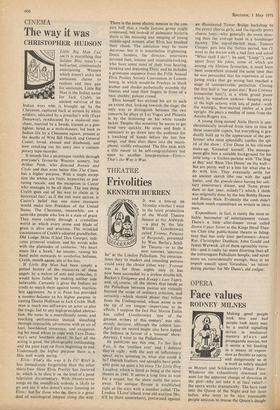THEATRE
Frivolities
KENNETH HURREN
It was a toss-up on Monday whether I went to the latest production of the World Theatre Season at the Aldwych —a play by the late Witold Gombrowicz called Yvonne, Princess of Burgundy, presented by West Berlin's Schil- ler Theatre—or to the new summer 'spectacu- lar' at the London Palladium. No conscien- tious duty to readers and intending patrons could sway the choice either way : Yvonne was in for three nights only (it has now been succeeded by a joyless double-bill, Beckett's Endgame and Krapp'.% Last Tape); and, of, course, all the shows that reside at the Palladium between pantos are virtually beyond the scope of ordinary criticism, and certainly—which should please that fellow from the Underground, whose name is on the tip of my tongue—impervious to its effects. I suppose the fact that Martin Esslin has called Gombrowicz 'one of the greatest writers of this century' was ulti- mately decisive, although the coldest late- April day on record might also have tipped the balance in favour of a 'summer' show. Anyway, I went to the Palladium.
Its publicists say this one, To See Such Fun, is the 'costliest ever' and I daresay they're right : with the sort of inflationary spiral we're spinning in, what else could it be? Ostrich feathers and spangles have prob- ably gone up quite a bit since The Little Dog Laughed, which is listed as being at the same theatre in 1940. It seems a long time to wait for a sequel, but the show melts the years away. The antique flavour is established right at the start with a number called 'The London I Love' (check your old wartime 78s; it'll be there somewhere), performed against
an illuminated Tower Bridge backdrop by the pretty chorus girls, and the equally pretty chorus boys—who generally do more minc- ing than the average hand in a hamburger factory. The top-of-the-bill man, Tommy Cooper, gets into the 'forties period, too el went to the doctor with a bad foot and asked "What shall 1 do?"; he said, "Limp" '), and apart from his jokes, some of which are among my lifetime favourites, it must have been somewhere around the same time that he was persuaded that his repertoire of con- juring tricks that go wrong had reached a stage of unimprovable perfection. Closing the first half is 'our guest star,' Russ Conway (remember him?), at a white grand piano which he somehow endows—banging away at the high octaves with lots of pedal—with the nostalgic, beer-stained timbre of a pub upright. He plays a medley of tunes from the Astaire-Rogers era.
A young thing named Anita Harris is ana- chronistically involved from time to time in these venerable capers, but everything is gra- dually built up toithe appearance of the per- former who most splendidly typifies the spi- rit of the show : Clive Dunn in his old-man make-up, `Grandad' himself. The manage- ment give him a suitable background for his little song—a kitchen-parlour with 'The Stag at Bay' and 'Bless This House' on the wall— but are pretty well at a loss for what else to do with him. They eventually settle for an ancient sketch (the one with the aged butler, and the grande dame having her soli- tary anniversary dinner, and 'Same proce- dure as last year, milady?') which I think was originally done by the late Bobby Howes and Binnie Hale. Evidently the costs didn't include much expenditure on writers or ideas men.
Expenditure, in fact, is rarely the most re- liable barometer of entertainment values. There's a little after-dinner revue called Down Upper Street at the Kings Head Thea- tre Club (the public-house theatre in Isling- ton) that has only four performers—Joyce Rae, Christopher Dunham, John Gould and James Warwick, all of them agreeably versa- tile—and is really far more diverting than all the extravagant Palladium hoopla; and never more so, coincidentally enough, than in an impish assault upon 'Grandma,' an intimi- dating partner for Mr Dunn's old codger.


































 Previous page
Previous page